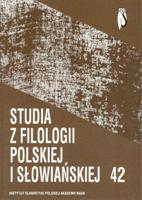Językowe i kulturowe konteksty towarzyszące wyznaczaniu granic tożsamości rodzinnej i grupowej w kaszubszczyźnie
Linguistic and Cultural Contexts Accompanying the Fixing of Family and Group Identity in Kashubian Dialect
Author(s): Ewa MasłowskaSubject(s): Language and Literature Studies
Published by: Instytut Slawistyki Polskiej Akademii Nauk
Summary/Abstract: Language uses an entire wealth of measures communicating relationship and establishing limits, beyond which foreignness begins. However, when differentiating between the ideas of familiar : foreign the main role is played by possessive pronouns and their derivatives. The starting point for this discussion has therefore been Kashubian pronoun-related word formations such as mojizna, svojizna, našëzna, created on the basis of mój, swój, nasz and denoting not only the immediate family, but also brothers- and sisters-in-law, parents-in-law and distant relatives, sometimes even fellow-countrymen. In this aspect the language of the Kaszuby region shows exceptional creativity and applies special principles to establish the limits and the character of family relationships. Equally significant in the construction of the profile of the familiar is the cultural context, in particular, those rituals of inclusion into, and exclusion from, the community. The linguistic picture of the world concentrated around the category of the familiar is co-shaped by customs accompanying the most important events in the life of the family and the social community in general (the so-called rites of passage), such as births, weddings, and deaths. Their reflection in the language will include speeches formulated specially for such occasions, as well as acts of nomination acts recorded in vocabulary and phraseology.
Journal: Studia z Filologii Polskiej i Słowiańskiej
- Issue Year: 2007
- Issue No: 42
- Page Range: 91-103
- Page Count: 13
- Language: Polish

